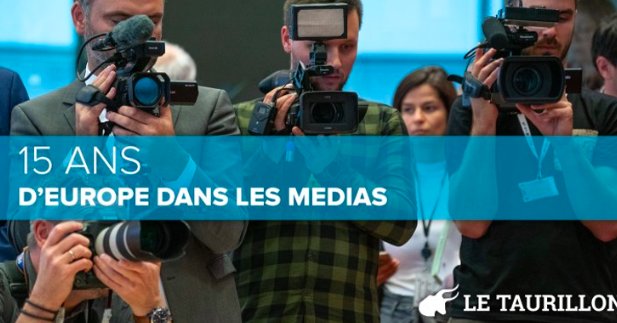“The most ‘no’ day”: the title written in white is striking on this blue background with four stars. It was the headline chosen by French newspaper Libération on Monday 30 May 2005, the day after the French referendum on the European Constitutional Treaty. That year, the European Union once again became a real subject of media interest, as it had been in 1992, at the time of the Maastricht agreements.
Fifteen years later, one of the few, if any, positive effects of the global coronavirus pandemic is that it has put the European Union back in the media spotlight. The French press has had no choice but to go back over the various support plans and strategies developed by European institutions and, more specifically, the European Commission. On 27 May 2020, Libération chose to put Europe back on the front page, with a photo portrait of Ursula von der Leyen, President of the Commission, and a headline translated as "Europe hits the bottom of its budget.”
The internet, a new tool for the European Union’s media coverage
Over the past period, the European Union has held three parliamentary elections. It has allowed more than 10 countries to join, and for the first time in its history, seen one of its members leave. It is, therefore, a favourable time for rich media coverage, as Michael Malherbe, expert in European communication and lecturer at the Sorbonne Nouvelle University, points out: “The first crucial part of these last fifteen years, and Le Taurillon is proof of this, is the Internet. The was blogs that influenced the vote in the 2005 campaign.”
When Le Taurillon was created in 2005, its sole purpose was to defend the draft of European Constitution. The year 2005 was significant in the media coverage of European issues in France, with the press taking up the different opinions on the topic, especially through the debate “for or against a European constitution.” It was important to such an extent that Conseil supérieur de l’audiovisuel, France’s media regulatory body, delivered a report on the referendum, published in July 2005.
The result of this referendum, a massive “No” vote by French citizens who turned out in large numbers to vote (more than 69% turnout, compared with less than 43% in the continental elections the previous year) led to a renewed interest in European issues. But as is often the case, these issues are relayed through “national” readings. In 2007, Stéphane Carrara wrote an analysis of the “relations between the European Union and national media” in our magazine. The trouble lays here: “the mainstream press and TV channels show no interest in Europe and consider the EU as “not sexy enough”, or “not saleable.””
At the same time, Europe news is increasingly shared on the internet. “The Web and Europe have a rich shared history”, adds Michael Malherbe. “From the beginning of the web’s development, since Europe has been mistreated both literally and figuratively, it has become an object of online debate. The past fifteen years have been a fruitful time for the emergence of media such as Euractiv, Contexte, Politico Europe.”
The specialist was already talking about it in 2015, in one of his publications : transnational attempts at European media coverage have historically encountered difficulties in developing, because there is, strictly speaking, hardly any European public space. In France, the national media maintain a nationalist reading of European news. However, the European Union is gradually carving out a place for itself, between the “International’ and “France” pages.
A new awareness of Continental issues
Each new European election is an opportunity to observe changes in the media treatment of Europe in France. In 2009, the media focused mainly on Cohn-Bendit’s or Martine Aubry’s list or the defeat of British Labour. The treatment of the European elections was rather ideological, one had to be for or against. The debate was rather dusty and did not allow for any nuance“, recalls Michael Malherbe. On the other hand, the lecturer pointed out that for the last continental election in 2019,”work has been done to go into a little more detail on European issues.”
For the expert, this evolution can be explained in simple: “the news on the past mandate was de facto European […] the Euro Zone, Brexit, the migrant crisis, everyone was talking about it, and it was discussed in other countries, so this time we could make more measured judgements”. The public has, over the few past years, acquired a new awareness of European issues.
In 2007, the consequences of the global financial crisis on the European Union, and on the Euro Zone in particular, brought Europe back into the forefront. The situation in Greece, and the debates surrounding it, were descried in detail by the French press. For many French newspapers, it was time to introduce some technical aspects to their explanations. Structural Funds, Eurogroup, Eurozone, Commission, ECB rates... The Greek debt crisis was an opportunity - even despite itself - to introduce readers to some of the little-known aspects of the Union. For example, the media outlet, La Tribune, Specialising in in economic issues, explained the plans put in place by the EU to “relieve Greece.”
A few years later, it is the question of the “migration crisis” that became the focus of media debates. From summits to discussions, the subject swelled and imposed itself in Europe’s media. This issue is a “challenge” for the European Union and its tragic consequences are resurfacing in all corners of the continent: the discovery of [a lorry full of corpses in Austria - https://www.lepoint.fr/monde/tragedies-en-autriche-et-en-mediterranee-l-europe-face-a-la-folie-de-la-crise-migratoire-28-08-2015-1960129_24.php] , the discovery of the body of Aylan Kurdi, just three years old, on a beach in Turkey, and the regular media coverage of the dramatic situations in the “Calais jungle”, all against the backdrop of the political impotence of the institutions. The European Union is at the same time more and more recognised, as an actor and even as being responsible for this crisis, and on the other still remains a vague, rather distant entity, personified most often by Angela Merkel.
2016-2017: Brexit and Macron to “revive Europe”
Barely a year later, it was Brexit that put Europe back in the centre of media attention. On the Europresse software, which keeps the archive of many French media, the term ’Brexit’ first appeared in 2012, but in all, more than 167,677 entries were recorded in the various publications over the next eight years. The French press focuses primarily on demonstrating why the United Kingdom should stay in the EU. Gradually, the subject gained in importance, until the referendum, whose result was surprising, and then the negotiations, which dragged on and left the impression that a turning point had been reached. French newspaper, Le Point does not hesitate to speak of the absurdity of the century, while another, Les Échos take a stance which is increasingly widespread: “Let’s use Brexit to revive Europe”.
In this singular context, the European Union has emerged as one of the important themes of the French presidential elections of 2017. One of the candidates even openly led their campaign around the rejection of the European project: François Asselineau chose an evocative slogan, “Frexit”. More importantly, this introduction of European issues into the electoral debate corresponded to the wishes, admittedly antagonistic, of the two candidates who qualified for the second round. On the one hand, Marine Le Pen announced her will to “get done with the Union” as early as February 2017, before taking a very weak stance on its exit during a debate between election rounds. According to L’Express, it was a defining moment. For his part, candidate Macron positioned himself early as a defender of the European Union and, across the continent, his election is seen as “a victory for Europe.” Once more, the European Union finds itself in the media and in public discourses but portrayed in a very nationalised and divergent vision, according to the candidates and the newspapers in question.
Once elected, Emmanuel Macron did not wait to start writing in non-French media. His text, “For a European revival”, published on 5 March in 28 European daily newspapers and in 22 different languages, generated a variety of reactions. But this type of initiative is very innovative. “What we observe at the level of heads of state and government is an attempt on their part is to try and invest more in non-national press by publishing articles in languages other than their own”, Michael Malherbe explains. Merkel’s texts published in other countries, the translation of Von Der Leyen’s declarations… “European affairs, in a certain way, have become Europeanised […] they used to be handled mainly by press correspondents in Brussels, but nowadays it is done a little more widely with the occasional mobilisation of foreign media,” explains the specialist.
‘Light Euroscepticism’: an obstacle to more extensive media coverage
Michael Malherbe notes “a rise of the level of journalists’ technical skills” when it comes to European issues. However, "titles are being swallowed up: the latest crisis has hit the media very hard. Investment in European information is disappearing. There are fewer and fewer permanent correspondents, the teams are shrinking in Brussels, but also in the capitals... We are a little less well-informed by national media and it will be more through other means that the news from the other member states will reach us.”
Today, Michael Malherbe is worried about the resurgence of what he calls “light Euroscepticism”.”Europe has remained the poor relation, it has deteriorated because, for a very long time, being pro-European was a morally just and politically profitable stance, whereas today, I find “light euroscepticism“is a fairly widespread position. By this, I mean that if you want to be”fashionable “in the media, you have to criticise Europe a bit.” Being hard on Europe or simply avoid talking about it. A simple search using the Europresse software yields 2190 results instances where national press articles used the expression “the European Union” in 2005. By 2018, there were only 559. And yet, there is an urgent need to talk about Europe, especially as a study carried out at the beginning of 2020 shows that a majority of French people would like to be better informed about European issues.


Follow the comments: |
|
